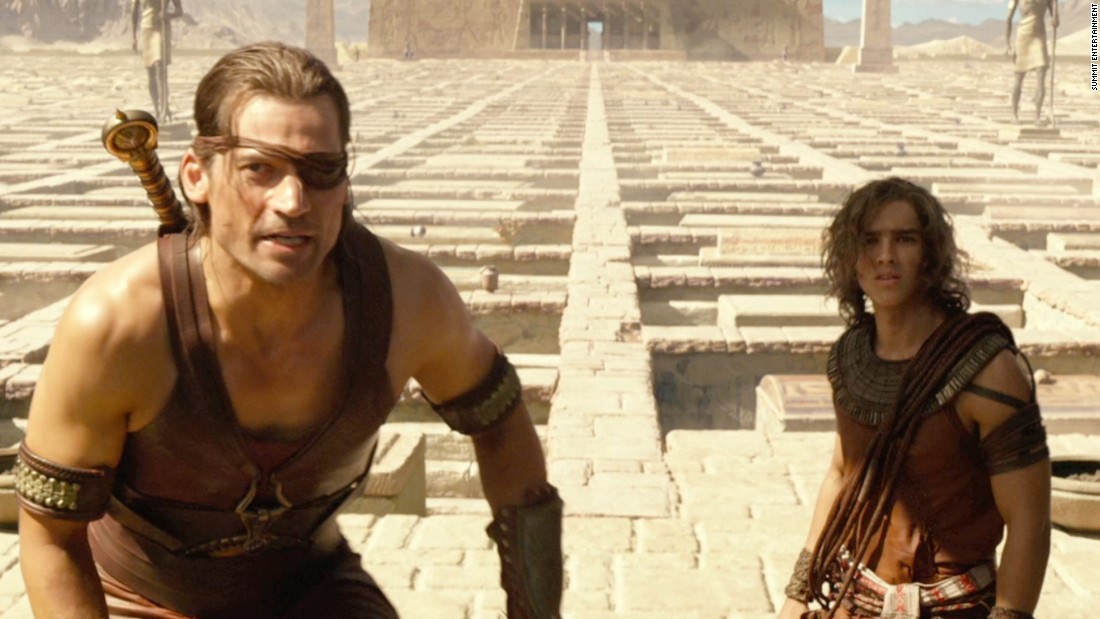
"Gods of Egypt" may be the most beautiful movie ever shot with a digital camera (technophiles would be pleased to know that the film puts the newest Panavision Primo lenses into practice without hesitancy), but who's to say that this is a good thing? Director Alex Proyas, who last worked on the science-fiction thriller entitled "Knowing," wanted a big budget and enough artistic freedom to make any filmmaker green with envy, but this flashy, clunky excuse for a picture certainly has more missteps than triumphs, and I could never get past its overreliance on special effects and dialogue that is overtly cheap and hollow. There's also a nagging issue with the actors' costumes, which are mostly in pristine condition—I guess all that icky desert sand would have made the film just too darn authentic.
Wardrobes aside, it is a schizophrenic tone that helps "Gods of Egypt" become a choice example of bad scriptwriting (the movie is one part epic and three parts goof fest), and although the picture has that movieness quality that so many audiences long for, it is simply too lengthy and too predictable to be deemed an outright success. And I regret even mentioning this, but as much as the film enthralls with its lavish visuals and squeaky-clean appearance, there does seem to be a problem with the integration of the special effects. (Meaning, we're not supposed to be able to differentiate between the foreground and the backdrop, and "Gods" not only makes this all too easy, but there are several action scenes that deserve the designation of cringeworthy.)
The lackluster story: Horus (Nikolaj Coster-Waldau), god of the sky and heir to the throne of Egypt, is just about to be crowned king, that is, of course, until Set (Gerard Butler), god of the desert and all things tinged with darkness, swoops in and proclaims himself to be the rightful successor. (Apparently, Set feels as if he has been neglected all these years considering his brother, Osiris, has ruled, and he has been confined to the arid, drab portion of Egypt.) Horus will have to reclaim his dignity and derail the dastardly plans of his uncle if peace and prosperity are to be returned to the land and its people. But wait, there's more—Bek (Brenton Thwaites), a common thief and doubter of the Gods, must work with Horus to bring back his lost love in Zaya (Courtney Eaton), and if I divulge any more of the plot, then I risk spoiling the few surprises that the film haphazardly provides.
Apart from Butler, who gives life to a character that is less than deserving, there isn't much to praise in the acting department, yet I will say that the young actors on hand fail to impress in roles that are built to showcase their talents. Furthermore, Coster-Waldau is overly wooden in a part that surely required more enthusiasm, and most of the other performances were positively phoned in. This is not to mention the fact that every single actress that appears on screen dons some scantily clad outfit designed to enhance features that have little to do with actual aptitude; I haven't seen this much cleavage outside of a Russ Meyer picture.
I'd be lying if I said that "Gods of Egypt" didn't embody that big box-office flair, yet it really doesn't amount to much. (Depending on the film's performance, financially speaking, we might just have the first flop of the new year. Thank God for those Australian tax incentives.) Proyas did his job—the camerawork on display is sufficient enough, and there are a few exceptional uses of forced perspective and foreground framing—but this addition to the sword-and-sandal or neo-mythology genre would hardly qualify as memorable, and if this were a genuine depiction of ancient Egypt, then I would sincerely have no part of it. (Oversized flying scarabs and giant fire-breathing snakes make it into this unusual fantasy realm, and whether purposely or not, the film saps the romanticism out of this otherwise unforgettable era of history.) There are a number of themes at play (there's a statement on class and a conveyance of equality, as well as an anti-materialist message), but it is impossible to focus on such things when the movie's standout attribute is its appearance. For the record, I give "Gods of Egypt" a "C" for creativity.
As for the whitewashing issue that seems to pervade the production: One must know that this practice of casting mainly Caucasian actors in parts that warrant ethnical authenticity is entirely common. In fact, one could say that this exercise is as old as the industry itself. Now, I'm not going to sit here and crucify the picture for its shameless ethnical inaccuracies (the casting of Geoffrey Rush as the sun god Ra should raise some eyebrows); I'm sure that it wouldn't make a difference either way. Sad to say, revenue and eminence will always take the place of believability, and whitewashing will continue in Hollywood as long as moneymaking is the name of the game.
No comments:
Post a Comment